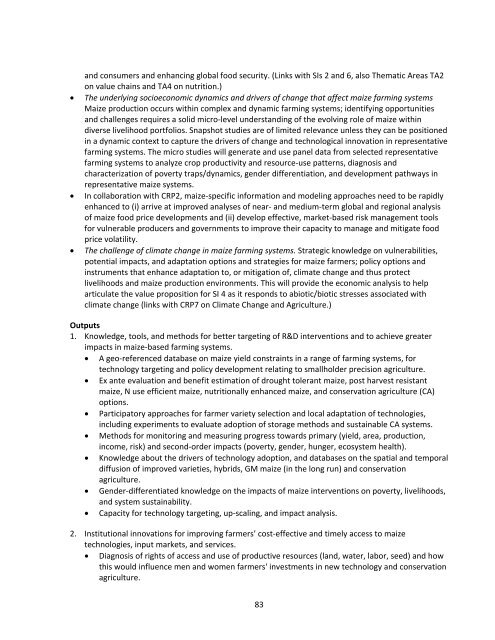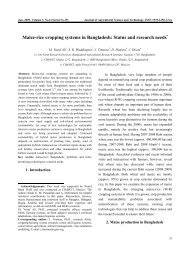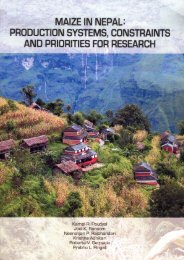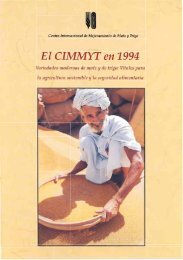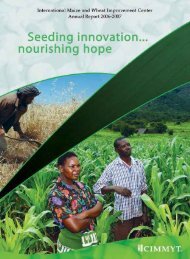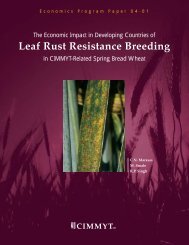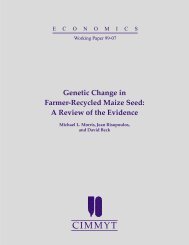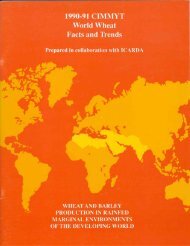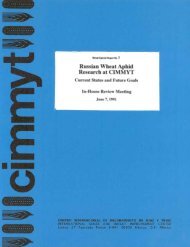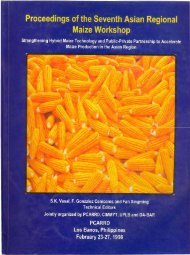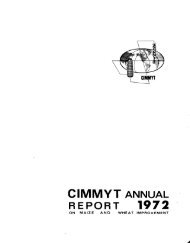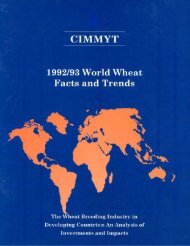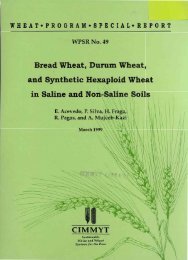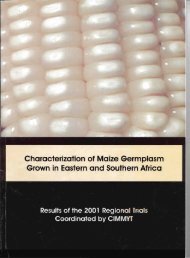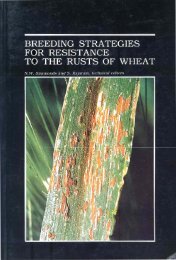Download - Maize
Download - Maize
Download - Maize
You also want an ePaper? Increase the reach of your titles
YUMPU automatically turns print PDFs into web optimized ePapers that Google loves.
and consumers and enhancing global food security. (Links with SIs 2 and 6, also Thematic Areas TA2<br />
on value chains and TA4 on nutrition.)<br />
The underlying socioeconomic dynamics and drivers of change that affect maize farming systems<br />
<strong>Maize</strong> production occurs within complex and dynamic farming systems; identifying opportunities<br />
and challenges requires a solid micro‐level understanding of the evolving role of maize within<br />
diverse livelihood portfolios. Snapshot studies are of limited relevance unless they can be positioned<br />
in a dynamic context to capture the drivers of change and technological innovation in representative<br />
farming systems. The micro studies will generate and use panel data from selected representative<br />
farming systems to analyze crop productivity and resource‐use patterns, diagnosis and<br />
characterization of poverty traps/dynamics, gender differentiation, and development pathways in<br />
representative maize systems.<br />
In collaboration with CRP2, maize‐specific information and modeling approaches need to be rapidly<br />
enhanced to (i) arrive at improved analyses of near‐ and medium‐term global and regional analysis<br />
of maize food price developments and (ii) develop effective, market‐based risk management tools<br />
for vulnerable producers and governments to improve their capacity to manage and mitigate food<br />
price volatility.<br />
The challenge of climate change in maize farming systems. Strategic knowledge on vulnerabilities,<br />
potential impacts, and adaptation options and strategies for maize farmers; policy options and<br />
instruments that enhance adaptation to, or mitigation of, climate change and thus protect<br />
livelihoods and maize production environments. This will provide the economic analysis to help<br />
articulate the value proposition for SI 4 as it responds to abiotic/biotic stresses associated with<br />
climate change (links with CRP7 on Climate Change and Agriculture.)<br />
Outputs<br />
1. Knowledge, tools, and methods for better targeting of R&D interventions and to achieve greater<br />
impacts in maize‐based farming systems.<br />
A geo‐referenced database on maize yield constraints in a range of farming systems, for<br />
technology targeting and policy development relating to smallholder precision agriculture.<br />
Ex ante evaluation and benefit estimation of drought tolerant maize, post harvest resistant<br />
maize, N use efficient maize, nutritionally enhanced maize, and conservation agriculture (CA)<br />
options.<br />
Participatory approaches for farmer variety selection and local adaptation of technologies,<br />
including experiments to evaluate adoption of storage methods and sustainable CA systems.<br />
Methods for monitoring and measuring progress towards primary (yield, area, production,<br />
income, risk) and second‐order impacts (poverty, gender, hunger, ecosystem health).<br />
Knowledge about the drivers of technology adoption, and databases on the spatial and temporal<br />
diffusion of improved varieties, hybrids, GM maize (in the long run) and conservation<br />
agriculture.<br />
Gender‐differentiated knowledge on the impacts of maize interventions on poverty, livelihoods,<br />
and system sustainability.<br />
Capacity for technology targeting, up‐scaling, and impact analysis.<br />
2. Institutional innovations for improving farmers’ cost‐effective and timely access to maize<br />
technologies, input markets, and services.<br />
Diagnosis of rights of access and use of productive resources (land, water, labor, seed) and how<br />
this would influence men and women farmers' investments in new technology and conservation<br />
agriculture.<br />
83


